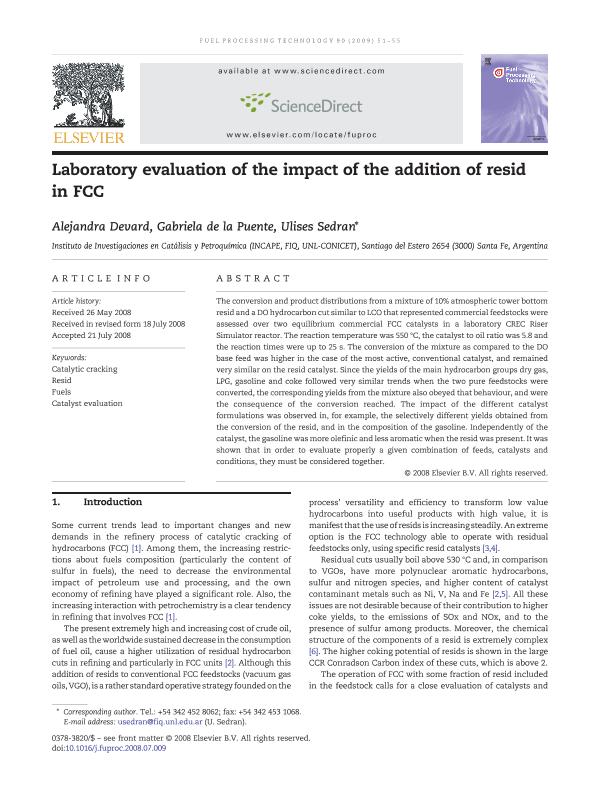Mostrar el registro sencillo del ítem
dc.contributor.author
Devard, Alejandra Veronica

dc.contributor.author
de la Puente, Gabriela

dc.contributor.author
Sedran, Ulises Anselmo

dc.date.available
2018-08-27T15:34:38Z
dc.date.issued
2009-01
dc.identifier.citation
Devard, Alejandra Veronica; de la Puente, Gabriela; Sedran, Ulises Anselmo; Laboratory evaluation of the impact of the addition of resid in FCC; Elsevier Science; Fuel Processing Technology; 90; 1; 1-2009; 51-55
dc.identifier.issn
0378-3820
dc.identifier.uri
http://hdl.handle.net/11336/57180
dc.description.abstract
The conversion and product distributions from a mixture of 10% atmospheric tower bottom resid and a DO hydrocarbon cut similar to LCO that represented commercial feedstocks were assessed over two equilibrium commercial FCC catalysts in a laboratory CREC Riser Simulator reactor. The reaction temperature was 550 °C, the catalyst to oil ratio was 5.8 and the reaction times were up to 25 s. The conversion of the mixture as compared to the DO base feed was higher in the case of the most active, conventional catalyst, and remained very similar on the resid catalyst. Since the yields of the main hydrocarbon groups dry gas, LPG, gasoline and coke followed very similar trends when the two pure feedstocks were converted, the corresponding yields from the mixture also obeyed that behaviour, and were the consequence of the conversion reached. The impact of the different catalyst formulations was observed in, for example, the selectively different yields obtained from the conversion of the resid, and in the composition of the gasoline. Independently of the catalyst, the gasoline was more olefinic and less aromatic when the resid was present. It was shown that in order to evaluate properly a given combination of feeds, catalysts and conditions, they must be considered together.
dc.format
application/pdf
dc.language.iso
eng
dc.publisher
Elsevier Science

dc.rights
info:eu-repo/semantics/openAccess
dc.rights.uri
https://creativecommons.org/licenses/by-nc-sa/2.5/ar/
dc.subject
Catalytic Cracking
dc.subject
Resid
dc.subject
Fuels
dc.subject
Catalyst Evaluation
dc.subject.classification
Otras Ingeniería Química

dc.subject.classification
Ingeniería Química

dc.subject.classification
INGENIERÍAS Y TECNOLOGÍAS

dc.title
Laboratory evaluation of the impact of the addition of resid in FCC
dc.type
info:eu-repo/semantics/article
dc.type
info:ar-repo/semantics/artículo
dc.type
info:eu-repo/semantics/publishedVersion
dc.date.updated
2018-08-24T15:33:56Z
dc.journal.volume
90
dc.journal.number
1
dc.journal.pagination
51-55
dc.journal.pais
Países Bajos

dc.journal.ciudad
Amsterdam
dc.description.fil
Fil: Devard, Alejandra Veronica. Consejo Nacional de Investigaciones Científicas y Técnicas. Centro Científico Tecnológico Conicet - Santa Fe. Instituto de Investigaciones en Catálisis y Petroquímica "Ing. José Miguel Parera". Universidad Nacional del Litoral. Instituto de Investigaciones en Catálisis y Petroquímica "Ing. José Miguel Parera"; Argentina
dc.description.fil
Fil: de la Puente, Gabriela. Consejo Nacional de Investigaciones Científicas y Técnicas. Centro Científico Tecnológico Conicet - Santa Fe. Instituto de Investigaciones en Catálisis y Petroquímica "Ing. José Miguel Parera". Universidad Nacional del Litoral. Instituto de Investigaciones en Catálisis y Petroquímica "Ing. José Miguel Parera"; Argentina
dc.description.fil
Fil: Sedran, Ulises Anselmo. Consejo Nacional de Investigaciones Científicas y Técnicas. Centro Científico Tecnológico Conicet - Santa Fe. Instituto de Investigaciones en Catálisis y Petroquímica "Ing. José Miguel Parera". Universidad Nacional del Litoral. Instituto de Investigaciones en Catálisis y Petroquímica "Ing. José Miguel Parera"; Argentina
dc.journal.title
Fuel Processing Technology

dc.relation.alternativeid
info:eu-repo/semantics/altIdentifier/doi/http://dx.doi.org/10.1016/j.fuproc.2008.07.009
Archivos asociados
